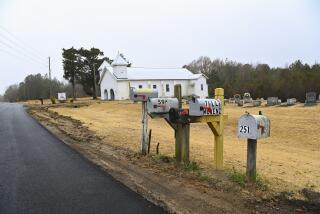A Hippieâs Bad Dream: Communist Goes GOP
AUSTIN, Tex. â The man who would save Americaâs welfare system from its own good intentions discovered Marxism as an undergraduate, Christianity as a doctoral candidate, and a philosophical kindred spirit in Newt Gingrich while a journalism professor in this hill-country college town.
Marvin Olasky, 45, came to Gingrichâs attention as the author of âThe Tragedy of American Compassionâ (Regnery Gateway, 1992)--a scholarly, slow-selling volume tracing the history of charity in the United States. When Gingrich hailed the book during his inaugural address to Congress as Speaker of the House, Olasky went from obscurity to fame among an influential circle of Washington conservatives. The book, reissued in paperback with a bright yellow âRecommended by Newt Gingrichâ emblazoned on front, is now in its fourth printing. Former education secretary William Bennett praised it as âthe most important book on welfare and social policy in a decade.â
âItâs been weird,â said Olasky of the unexpected attention. âIâm a writer, not a policy-maker.â
In his book--based on centuries-old accounts of charity unearthed in the dusty stacks of the Library of Congress--Olasky argues for a return to the small, nonprofit programs that were the hallmark of American welfare in the 19th Century. The pilgrims were right, he says, to require work in exchange for food and to personally âchallengeâ the poor to become independent.
Government relief agencies that cut checks for anonymous millions âmay miss fewer people materially, but we have a system devoted to sustaining them in poverty,â Olasky said. âOnce a person is entitled to a particular amount of money regardless of behavior,â the incentive to improve evaporates. Olasky prescribes a privatized system of âeffective compassion,â in which conditional aid is dispensed to the âworthy poorâ and the able-bodied are put to work. The road to Republican party favor was a circuitous one for Olasky, who describes himself as the black sheep in a family of liberals. His father taught at a Hebrew school near Boston. Olasky abandoned Judaism as a teen-ager and considered himself an atheist and communist while attending Yale University on a scholarship during the late 1960s. As a student, he took his opposition to the Vietnam war to the halls of Congress--where then-Speaker John McCormack let Olasky and his roommates spin around in McCormackâs high-backed chair.
After a brief stint as a reporter for the Boston Globe, Olasky rode a bike cross-country and settled in the mountainous outpost of Bend, Ore., where his interest in Marxism grew. By 1972, he was a card-carrying member of the Communist Party of America, firm in his belief that âradical change could come . . . through dictatorial action by a wise collective of leaders who would act for the good of all,â Olasky wrote in a recent article titled âMarxism and Me.â
Olaskyâs spiritual epiphany came two years later when, as a doctoral candidate in American culture at the University of Michigan, he read the Bible in Russian to satisfy a foreign language requirement. The Scriptures, which Olasky had regarded as fairy tales, seemed now to ring true. In 1976, he was baptized and joined a church.
He ended up at the University of Texas, Austin, home to the presidential papers of Lyndon B. Johnson, architect of the government-financed Great Society. The irony of this is not lost on Olasky, who considers it one of Godâs little jokes. So, too, may be his presence in Austin, which, by Texas standards, is a hotbed of liberal thought. âItâs certainly a hostile environment there,â said Olasky, who recently lost a public stand against selling condoms in student dormitories.
An instructor of media history since 1983, Olasky is a reserved, scholarly presence: Bearded and bespectacled, he is a husband of 19 years, father of four boys, and owner of a potbellied dachshund named Wolf. His wife, Susan, founded the antiabortion Austin Crisis Pregnancy Center, which Marvin Olasky has chaired. In his work with the center, he recalls one case in particular in which his intervention helped reunite a young pregnant woman and the man who would later become her husband. The couple is now raising the child together.
âThe Tragedy of American Compassionâ is Olaskyâs 14th book. Other book topics include the misguided impulses of corporate philanthropists, the social history of abortion in America and the anti-Christian bias of the media. On leave from the University of Texas until 1996, Olasky edits a Christian newspaper called World from his unassuming brick house in a wooded neighborhood north of the campus. He has just completed a condensed version of âThe Tragedy of American Compassion,â which will be released this fall. A third book in the welfare series will describe the small, private charities Olasky envisions multiplying across the nation.
âWhen I see this going on in different places, my question is, âIs this so unusual that it canât be replicated?â The answer is no,â he said. âIf ordinary people can become heroic in the process of doing this, then this thing has a chance to go.â
*
Olaskyâs idealism rankles some historians, who say he is romanticizing the past, where the poor were exploited and languished in filthy poorhouses. Robert Bothwell, executive director of the National Committee for Responsive Philanthropy, has noted that âlife is far more complex now,â and that economic and sociological changes make a return to the past a fantasy. But Olasky believes he speaks from experience when he says the current system isnât working, so âwe should learn from the past in the sense of what they did right.â
Five years ago, Olasky dressed in rags and roamed the streets of Washington, D.C., as a homeless man. Shelters plied him with sandwiches and soft drinks but ignored his spiritual needs, he said. When he asked for a Bible, he received a bagel.
Olasky calls this âfeed-and-forgetâ principle a false form of compassion, comparing it to giving a chocolate chip cookie to a little girl wandering the streets at midnight and sending her on her way. âFew of us will . . . feel that we have acted with compassion. Why should we act differently to others who are also lost in the dark?â he said.
In Olaskyâs vision of privatized welfare, individuals will make a ânarrow but deepâ commitment to the poor, becoming as personally involved as time allows. âPeople wouldnât mind investing their own time and money if they had a sense it was actually helping,â he said. âThatâs the trade that people can be offered: Replace the welfare system with a system thatâs more personal and private, and have the satisfaction of doing something useful.â
That may sound unrealistic in an era when motorists run red lights to avoid roadside window cleaners. But Olasky is convinced that Americans are primed for a radical change.
âI suppose I could have called [the book] âThe Frustration of American Compassion,â but itâs much more than that,â he said. âItâs tragic when, with good intentions, the ball starts rolling but it ends up in a ditch. Thatâs what happened here. People with good intentions ended up with tragic consequences.â
More to Read
Sign up for our Book Club newsletter
Get the latest news, events and more from the Los Angeles Times Book Club, and help us get L.A. reading and talking.
You may occasionally receive promotional content from the Los Angeles Times.







